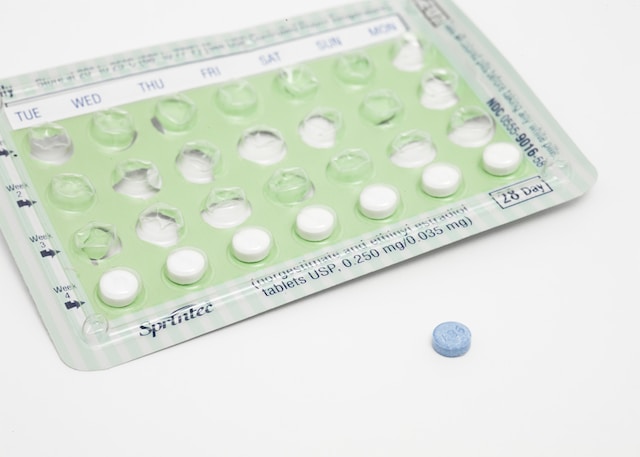What actually happens when you stop taking birth control?
TikTok creators are describing side effects from getting off the pill, but that might not be what’s causing their symptoms
Emily Driehaus • March 31, 2023

According to doctors, “post-birth control syndrome” after discontinuing the pill might be symptoms of other medical issues, not the result of birth control. [Credit: Thought Catalog | Unsplash]
If you’ve been on TikTok recently, you might have seen a content creator talking about how they’ve stopped using hormonal birth control. Users have noticed an uptick in these videos, many from creators claiming to be “hormone coaches,” detailing how hormonal birth control, specifically the pill, creates health issues and leads to a host of uncomfortable side effects they’re calling “post-birth control syndrome.”
However, the information they’re spreading isn’t entirely accurate.
Most contraceptive pills introduce synthetic versions of estrogen and progesterone into the body. The combination of different amounts of these hormones triggers changes in the uterus that work together to prevent pregnancy, like stopping ovulation, thickening cervical mucus to prevent sperm from swimming into the uterus, and thinning endometrial tissue – the inner lining of the uterus – to prevent a fertilized egg from attaching.
During pregnancy, estrogen and progesterone tell the brain that a fetus is developing and ovulation needs to stop. Without a pregnancy to release these hormones, the unfertilized egg and thickened uterine lining break down and shed during the menstrual period. The menstrual cycle begins again with the maturation of eggs in the ovaries and new endometrial tissue growth, triggered by the lack of a pregnancy. In other words, the body is always preparing to be ready for pregnancy if an egg successfully meets a sperm cell.
The pill interrupts those preparations with hormones. The estrogen and progesterone in the pill signal the brain like a pregnancy would, telling it to stop ovulation. The hormones also suppress the messages to thicken endometrial tissue and thin cervical mucus, creating an environment that isn’t sperm- or fetus-friendly.
Because estrogen and progesterone have other roles outside of pregnancy, it’s no secret the pill can have some side effects. Dr. Jennifer Robinson, an OB/GYN at Johns Hopkins School of Medicine, says she has patients who experience irregular bleeding, mild nausea, breast soreness and mild mood changes. She notes that younger patients might feel these side effects more acutely because they’re less likely to have experience with other hormonal birth control methods, so they’re more aware of any changes. Other hormonal methods, like the implant or the patch, are also associated with similar side effects.
Some TikTok creators are citing these side effects as reasons why they stopped taking the pill, only to be met with symptoms of “post-birth control syndrome.” They say symptoms include acne, hair loss, headaches, major mood swings and more. Robinson says developing acne is possible after discontinuing the pill, because estrogen in the pill can help lower the levels of other acne-causing hormones, but the other symptoms are not likely linked to birth control.
“Bodies change over time,” she says. “If you started taking the pill at 16 and you stop it at 26, you’re a different person at 26. It’s possible that new things will evolve over time that are coincident with the pill, but aren’t related to the pill.”
Many of these “hormone coaches” are also advertising cleanses, like supplement regimens or detox drinks, to “regulate hormones” after the pill. But Robinson says this isn’t necessary, regardless of how long a person has been on the pill.
“The hormones from the pill are out of their system within a week,” she says. “The body’s liver and kidneys are going to do that work all on their own.”
This quick turnaround time is also why using a different birth control method after stopping the pill is important for patients who don’t want to become pregnant. And if you’re thinking about stopping the pill for any reason, Robinson says that a healthcare provider can be a partner in decisions about your health – but the final decision is always up to you.